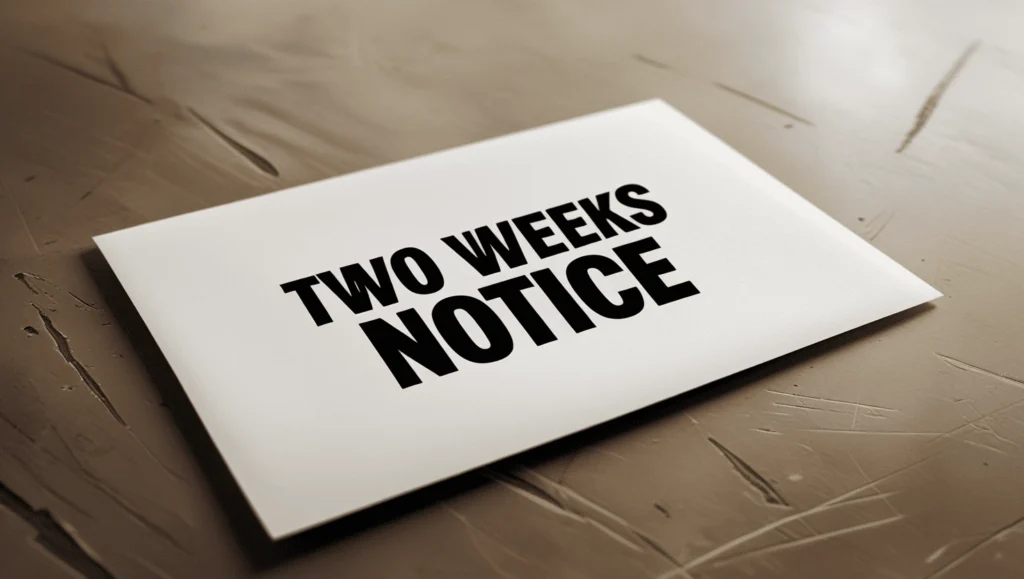Leaving a job is a big step, and it’s important to handle it with care. Resigning gracefully shows professionalism and respect for your employer. A well-crafted 2 weeks notice letter helps ensure a smooth transition while protecting your professional relationships. This guide explains how to write one effectively, ensuring it’s clear, concise, and easy to navigate.
By following this process, you can leave your role on good terms and maintain a positive reputation in your industry. Use a logical structure with clear headings like “Why You Need a 2 Weeks Notice Letter” and “How to Format Your Resignation Letter.” Including links to trusted resources, such as this guide to resignation etiquette, ensures readers have access to additional support and insights.
When and Why to Give Two Weeks’ Notice
Importance of Professionalism
Giving a two weeks’ notice letter is a vital step when resigning from a job. It shows respect for your employer and colleagues by giving them time to prepare for your departure. This practice helps maintain a positive relationship and ensures you leave on good terms. Employers appreciate employees who value professionalism, and your reputation as a reliable worker can follow you throughout your career.
Legal Requirements
In some regions or industries, giving a two weeks’ notice letter may be more than just courteous—it could be a legal requirement. Employment contracts often specify the notice period employees must provide before resigning. Failing to comply could lead to financial or legal consequences. Always review your employment agreement or company policies before submitting your resignation. Being informed helps you handle the process correctly and avoid unnecessary issues.
Exceptions to the Two-Week Rule
While giving two weeks’ notice is standard, there are situations where it may not be possible or necessary.
- Toxic Work Environment: If your job negatively impacts your mental or physical health, leaving immediately might be justified. Your well-being should always come first, especially if the workplace is unsafe or harmful.
- At-Will Employment: In regions where at-will employment laws apply, either the employer or employee can terminate the employment relationship at any time. In such cases, you might not be legally obligated to provide notice. However, offering a two weeks’ notice letter can still be beneficial for maintaining goodwill.
When resigning, consider your circumstances carefully. If possible, strive to leave on good terms. It demonstrates integrity and preserves your professional reputation.
To learn more about writing a professional two weeks’ notice letter, check out resources like NerdWallet or The Balance for guidance on best practices.

Key Components of a Strong Resignation Letter
When drafting a 2 weeks’ notice letter, it’s important to include essential elements that ensure clarity and professionalism. A well-structured resignation letter not only reflects positively on you but also facilitates a smooth transition for your employer. Below are the key components explained in detail:
1. Date and Your Contact Information
Start by including the current date at the top of your letter. Beneath the date, add your contact details, such as your full name, address, email, and phone number. This ensures your employer can easily reach you if needed.
2. Recipient’s Name and Title
Address your letter directly to your manager or supervisor. Be sure to use their full name and title, such as “Mr. John Doe, Manager.” This shows respect and ensures the letter reaches the intended person.
3. Clear Resignation Statement
Begin with a straightforward sentence announcing your resignation. For example, “I am writing to formally resign from my position as [Job Title] at [Company Name].” This leaves no room for ambiguity and sets the tone for the letter.
4. Effective Date of Resignation
Specify the exact date of your last working day, typically two weeks from the date of your notice. A statement like, “My last day will be [specific date],” makes it clear and allows your employer to plan for your departure.
5. Expressing Gratitude
Show appreciation for the opportunities and experiences you’ve had during your time with the company. A simple sentence like, “I am grateful for the chance to work with such a supportive team and grow professionally,” adds a positive tone to your resignation.
6. Offering Assistance with the Transition
Mention your willingness to help during the transition period. For instance, you can write, “I am happy to assist in training a replacement or transferring my responsibilities to ensure a smooth handover.” This demonstrates your professionalism and commitment to leaving on good terms.
7. Professional Closing
End your resignation letter with a polite closing. Use phrases like “Sincerely,” “Best regards,” or “Thank you” followed by your full name. This leaves a lasting impression and maintains a respectful tone.
Including these components in your 2 weeks’ notice letter ensures that your message is clear, professional, and considerate. For further guidance, you can explore templates and examples available online, such as those on sites like NerdWallet or The Balance, which provide resources for resigning gracefully.
If you need assistance tailoring your resignation letter for specific circumstances, feel free to reach out for support.

Writing Styles for Different Situations
When crafting your 2 weeks notice letter, the tone and content should match your reason for leaving. Here are common situations and tips for handling each professionally.
Resigning Due to a New Job Opportunity
If you’ve accepted a new position, express enthusiasm for your next step while remaining grateful to your current employer. For example, say, “I am excited to begin a new chapter in my career, but I deeply appreciate the opportunities and support I’ve received here.” Highlight what you’ve learned and how your time at the company prepared you for this opportunity. Be sure to offer assistance in the transition process. Maintaining goodwill can leave the door open for future collaborations.
Resigning Due to Personal Reasons
When leaving for personal reasons, keep your explanation concise. There’s no need to share personal details unless you’re comfortable doing so. A simple statement like, “This decision is based on personal factors, and I believe it’s the best choice for me at this time,” is sufficient. Follow this with gratitude for your time with the company and your willingness to help with a smooth handover. Staying positive ensures you part on good terms.
Resigning Due to a Toxic Work Environment
If your decision stems from a negative workplace experience, it’s essential to stay professional. Avoid mentioning any grievances in your letter. Instead, focus on the future by writing, “I have decided to pursue a new direction in my career.” Keep your tone neutral and polite. Express gratitude for any positive aspects of your role, such as learning experiences or supportive colleagues. A graceful exit helps preserve your reputation and avoids unnecessary conflict.
Resigning Due to Burnout
When burnout is the primary reason, prioritize personal well-being in your resignation. You might write, “After careful consideration, I have decided to step away from my role to focus on my health and well-being.” Avoid placing blame or criticizing your employer. Thank them for the opportunities they provided and offer help in the transition. This approach keeps the conversation positive and allows you to leave on a professional note.
For additional tips on crafting the perfect resignation letter, check out this guide to writing a 2 weeks notice letter.
By tailoring your letter to your specific situation, you can leave a lasting positive impression.
Tips for a Smooth Resignation
1. Schedule a Meeting with Your Manager
Before submitting your 2-week notice letter, arrange a meeting with your manager. If possible, meet in person to discuss your decision. If that’s not feasible, a video call is a good alternative. Informing your manager directly demonstrates respect and professionalism. It also allows you to express gratitude for the opportunity and ensures they hear the news from you first.
2. Communicate with Colleagues
Once your manager is informed, share the news with your colleagues. Be respectful and considerate when explaining your departure. Frame your announcement positively and focus on the future rather than any challenges you’ve faced. If appropriate, thank your team for their support during your time with the company. These conversations help maintain goodwill and leave a lasting positive impression.
3. Complete Outstanding Tasks
Before your last day, prioritize finishing key assignments. Make a checklist of outstanding tasks and deadlines to ensure everything is handled efficiently. If necessary, document ongoing projects to help your replacement or colleagues pick up where you left off. Taking these steps shows responsibility and helps minimize disruptions after your departure.
4. Maintain a Professional Demeanor
Throughout your resignation process, stay calm, polite, and professional. Even if you’ve had negative experiences, avoid venting frustrations to colleagues or in your 2-week notice letter. Focus on the positives, such as the skills you’ve gained or the opportunities the role provided. A professional attitude reinforces your reputation and builds trust for future references.
5. Avoid Burning Bridges
Your 2-week notice letter and exit discussions should be constructive. Refrain from making critical or negative comments about the company or your coworkers. Instead, express gratitude for your experience and emphasize your commitment to a smooth transition. Maintaining good relationships ensures you leave on the best possible terms, which can benefit you professionally in the future.
For more tips on crafting a professional resignation, visit NerdWallet’s Guide to Resignation.

Resignation Letter Templates and Examples
A well-written 2 weeks notice letter is key to leaving your job professionally and maintaining positive relationships. Below are templates tailored for different situations to help you get started.
Basic Resignation Letter Template
Use this general format for a standard resignation:
Subject: Two Weeks’ Notice of Resignation
Dear [Manager’s Name],
I am writing to formally notify you of my resignation from [Your Position] at [Company Name], effective two weeks from today, [Last Working Date].
Working at [Company Name] has been an incredible experience, and I appreciate the opportunities to learn and grow here. I am grateful for the support and guidance provided by you and the team.
To ensure a smooth transition, I will complete my current projects and assist in any way necessary during my remaining time. Please let me know how I can help.
Thank you for your understanding. I hope to stay in touch, and I wish [Company Name] continued success in the future.
Sincerely,
[Your Full Name]
Resignation Letter for a New Job Opportunity
If you are leaving for a new position, highlight your gratitude and excitement for the future:
Subject: Two Weeks’ Notice of Resignation
Dear [Manager’s Name],
I am writing to announce my resignation from [Your Position] at [Company Name], with my last day being [Last Working Date].
This decision was not made lightly, as I have greatly valued my time here. The support, mentorship, and opportunities I’ve received have been instrumental in my professional development. However, I have decided to pursue a new opportunity that aligns with my long-term career goals.
During my remaining time, I am committed to ensuring a seamless handover of my responsibilities. I am happy to assist with training a replacement or transitioning my tasks.
Thank you for your guidance and understanding. I wish [Company Name] continued success and hope to remain in contact.
Best regards,
[Your Full Name]
Resignation Letter for Personal Reasons
If personal circumstances require your departure, focus on gratitude and professionalism:
Subject: Two Weeks’ Notice of Resignation
Dear [Manager’s Name],
Please accept this letter as my formal notice of resignation from [Your Position] at [Company Name]. My last day will be [Last Working Date].
This was a difficult decision driven by personal reasons that require my full attention. I want to express my heartfelt gratitude for the opportunities and experiences I’ve had during my time at [Company Name].
I am committed to making this transition as smooth as possible and will complete all ongoing tasks and assist in handing off responsibilities.
Thank you for your understanding and support. I hope we can stay connected, and I wish the company every success in the future.
Sincerely,
[Your Full Name]
Additional Tips for Writing Your 2 Weeks Notice Letter
- Use a professional tone: Avoid emotional language and keep the focus on your transition.
- Be concise and clear: State your resignation, effective date, and appreciation upfront.
- Customize the letter: Tailor it based on your reason for leaving to make it more personal.
For more advice on resigning professionally, check resources like Indeed’s Resignation Tips or The Balance’s Guide to Resignation Letters.

